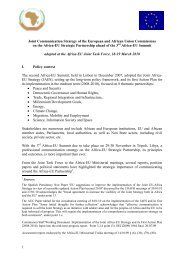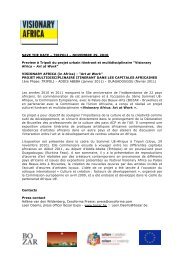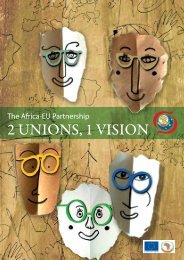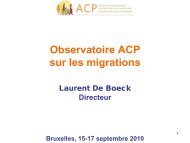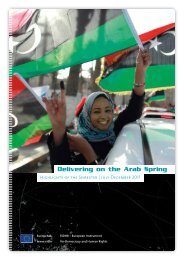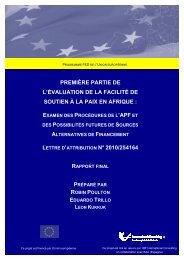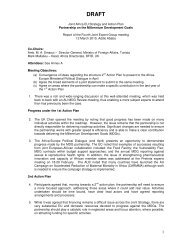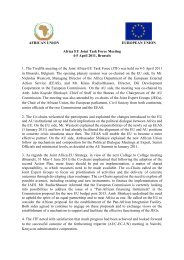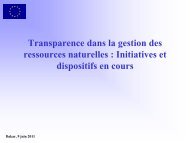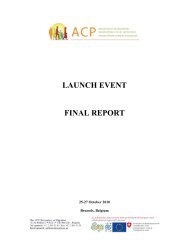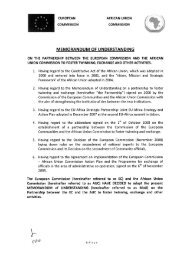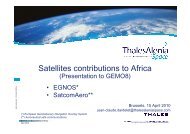part 1 of the african peace facility evaluation - European ...
part 1 of the african peace facility evaluation - European ...
part 1 of the african peace facility evaluation - European ...
You also want an ePaper? Increase the reach of your titles
YUMPU automatically turns print PDFs into web optimized ePapers that Google loves.
‣ EEAS, because APF finances <strong>peace</strong> and security activities.<br />
‣ The Legal service, whose agreement is required before initiating written procedures, except<br />
for decisions on standard acts to which it has already agreed in advance (‘repetitive acts’).<br />
‣ The EC Secretariat General, which may commit <strong>the</strong> EC vis-à-vis o<strong>the</strong>r institutions or bodies.<br />
‣ DG budget, because APF has a direct budgetary impact.<br />
‣ ECHO, because <strong>of</strong> <strong>the</strong> connections between APF and humanitarian actions.<br />
‣ OLAF, which must be consulted on proposals concerning areas vulnerable to fraud.<br />
The inter-service consultations take 10 working days if <strong>the</strong> file is less than 20 pages, which is<br />
generally <strong>the</strong> case for APF, o<strong>the</strong>rwise it may take 15 working days, or even three weeks. In case <strong>of</strong><br />
obvious political urgency (and not to make up for administrative delay), EC procedures allow DEVCO<br />
ei<strong>the</strong>r to ask <strong>the</strong> SG for permission to use <strong>the</strong> ‘fast track’ procedure (consultation ending with a<br />
meeting) or launch a shorter consultation. In any case, DEVCO can always proactively contact <strong>the</strong><br />
DGs consulted and ask <strong>the</strong>m to reply quicker.<br />
The ‘fast track’ procedure for inter-service consultations lasts for three days: two to revise <strong>the</strong><br />
documents and one for a special meeting. DEVCO used this procedure for some APF interventions,<br />
such as AMISOM II, MAES and MICOPAX 1A in December 2008 and in 2007 for <strong>the</strong> adoption <strong>of</strong> <strong>the</strong><br />
APF Action Programme 2008-2010.<br />
After <strong>the</strong> inter-service consultation process has ended, <strong>the</strong> dossier comes back to DEVCO and is<br />
revised according to <strong>the</strong> comments made by <strong>the</strong> de<strong>part</strong>ments consulted. This review normally takes<br />
around four days. DEVCO has never had a negative opinion from <strong>the</strong> inter-service consultation during<br />
<strong>the</strong> period analysed in this <strong>evaluation</strong>. The <strong>evaluation</strong> recommends sparing time through a 48-hour or<br />
72-hour no-objection process to replace <strong>the</strong> formal visa system. This would modernise and speed-up<br />
<strong>the</strong> ISC, which is mainly about information sharing. There would still be <strong>the</strong> possibility to object, and a<br />
meeting could be called in case a decision needed fur<strong>the</strong>r debate.<br />
TRANSLATION<br />
The ‘dossier’ is sent for translation into <strong>the</strong> three Commission working languages: it takes 5 to 10<br />
working days, depending on <strong>the</strong> length <strong>of</strong> <strong>the</strong> text. The backlog <strong>of</strong> work or holiday periods may delay<br />
translation. When <strong>the</strong> translations are finished, <strong>the</strong> dossier is encoded in <strong>the</strong> system and C3 head <strong>of</strong><br />
unit signs. Then, <strong>the</strong> dossier goes back to DEVCO, where <strong>the</strong> Assistant Director (one day) and <strong>the</strong><br />
Director (two days) sign and send it to <strong>the</strong> College <strong>of</strong> Commissioners for adoption.<br />
ADOPTION BY THE COLLEGE OF COMMISSIONERS<br />
During <strong>the</strong> period analysed in this <strong>evaluation</strong>, APF decisions were adopted by making use <strong>of</strong> <strong>the</strong><br />
‘written procedure’. The Commissioner for Development receives <strong>the</strong> dossier and gives his/her<br />
agreement. As described above for o<strong>the</strong>r stages, C6 <strong>of</strong>ficials informally discuss with <strong>the</strong> cabinet in<br />
advance to prevent any unforeseen problem, which takes three days. Then, <strong>the</strong> Secretariat General<br />
has three days to check <strong>the</strong> dossier again, before launching <strong>the</strong> written procedure with <strong>the</strong> members<br />
<strong>of</strong> <strong>the</strong> College <strong>of</strong> Commissioners: <strong>the</strong>y have five working days to oppose <strong>the</strong> APF decision, o<strong>the</strong>rwise<br />
it is adopted. The President <strong>of</strong> <strong>the</strong> Commission may decide, for special urgent matters, to use an<br />
accelerated procedure, in which case <strong>the</strong> written procedure is limited to 1 to 3 days, but this possibility<br />
has never been used for APF decisions.<br />
The adopted APF decision goes back to DEVCO, where <strong>the</strong> contribution agreement or grant contract<br />
with AU may be signed.<br />
Page 23 <strong>of</strong> 49




